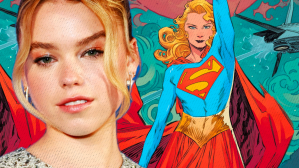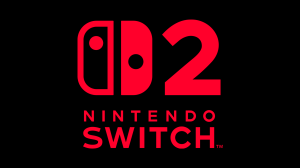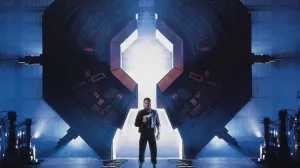From the moment Christopher Smith (John Cena) first stumbled into an alternate dimension in Season 2 of Peacemaker, the narrative has followed a seemingly predictable path. For starters, in this new reality, every person Chris encountered was white, a deliberate casting choice that signaled a more sinister meaning. In addition, powerful women like Emilia Harcourt (Jennifer Holland) were suddenly relegated to more modest and subservient roles. The most significant clue, however, was the heroic status of Peacemaker’s father, Auggie Smith (Robert Patrick). In the original dimension, Auggie was the villainous White Dragon and a virulent white supremacist before Chris killed him. Seeing him celebrated as a beloved hero was the final piece of evidence that pointed toward an unavoidable conclusion about this alternate reality.
Videos by ComicBook.com
The sixth episode of Peacemaker Season 2 finally confirmed that the alternate dimension was a version of Earth-X, a reality where Germany won the Second World War and the pervasive values of Nazism became the dominant global ideology. In that episode, every piece of the puzzle appeared to fall perfectly into place. The audience’s assumptions felt validated, and the season’s central conflict seemed clear: Chris would have to confront the ultimate evil embodied by his father’s Nazi counterpart. However, the seventh episode masterfully subverts this entire setup with a profound character twist that nobody saw coming. This single revelation redefines the season’s stakes and transforms its central message into something far more interesting. Warning: Spoilers below for Peacemaker Season 2, Episode 7.
Auggie Smith Is Not a Nazi (And That’s a Shock)

Episode 7’s pivotal confrontation begins after the alternate Auggie discovers John Economos (Steve Agee) in his home and learns the devastating truth about his son’s death at the hands of the original Peacemaker. Based on everything the audience thought they knew, Auggie’s reaction should have been cruel, violent, and vindictive. Instead, the character does the exact opposite. A grieving but shockingly reasonable Auggie enlists the help of his other son, Keith (David Denman), to capture the original Chris and bring him home safely to clear things up. The original Peacemaker confirms Auggie’s suspicions that his own son’s reckless behavior caused his death, and then the Blue Dragon expresses a desire for everyone to simply return to their proper dimensions and let bygones be bygones. This calm response is the first indication that the audience’s assumptions about him were completely wrong.
The episode also features a key scene in which Auggie explicitly reveals his true ideology. He declares his hatred for the term Nazi and everything their philosophy represents. Then, he explains that he feels powerless to fight against the oppressive global regime, so he focuses his energy on protecting his community from monsters and madmen, just as any traditional superhero would. Furthermore, he hopes the good he accomplishes is enough to compensate for his political inaction in the face of a fundamentally unjust system.
Auggie’s confession is reinforced when he scolds Keith for chasing after Leota Adebayo (Danielle Brooks), underlining that he tried to teach his sons values directly opposed to the Nazi precepts of racial purity. In short, this version of Auggie Smith genuinely loves his family, is a somewhat decent citizen, and was never a racist. This stunning twist serves the overarching themes of Peacemaker far more effectively than any direct combat against a one-dimensional villain ever could.
The Blue Dragon Political Alignment Exposes the Issues of the Original Earth

The alternate Auggie’s passionate speech about his moral compromises serves as an uncomfortable mirror for the 11th Street Kids, reflecting the deep-seated issues within their original reality. In addition, the Blue Dragon’s choice to fight supervillains while ignoring the systemic evil of his government forces the audience to examine the heroes of the main DCU. Despite not being a Nazi dimension, the original Earth is also filled with racism, profound social injustice, and a vast class divide. Yet, much like in the Nazi dimension, its superheroes often focus on colorful threats and their epic battles against supervillains instead of using their immense power to build a genuine utopia. With this clever twist, Peacemaker argues that people are complicated, and the world cannot be reduced to a simple fight between good and evil.
While Nazis are definitely evil, Peacemaker underlines that winning World War II did not magically turn the United States into a paradise. The world remains messy and imperfect because true progress is not about just defeating the obvious bad guys but also having the courage and conviction to use your freedom to actively fight for a better world every single day. Of course, it is far easier to ignore the structural flaws of society and punch a monster, which is exactly the compromise Auggie makes in the Nazi dimension. In that respect, there is not much difference between the Blue Dragon and the members of the 11th Street Kids. They have all become so accustomed to the world being what it is that they rarely stop to reflect on what they could do to make it fundamentally better. As a result, Peacemaker Season 2’s most brilliant twist forces both its characters and the fans to look past easy labels and confront the uncomfortable reality of moral compromise.
The season finale of Peacemaker is scheduled to premiere on October 9th on HBO Max.
How does Auggie’s complex morality change your perception of heroism in the DCU? Leave a comment below and join the conversation now in the ComicBook Forum!









